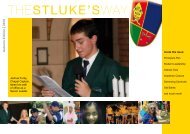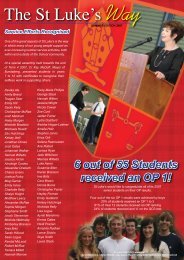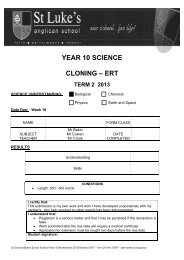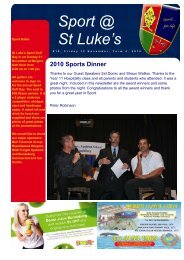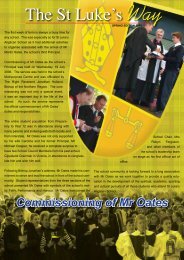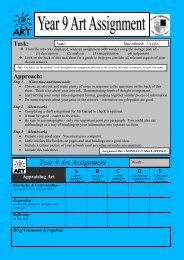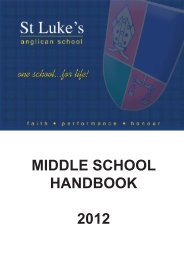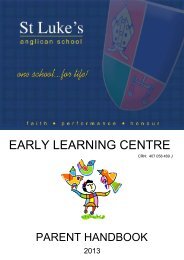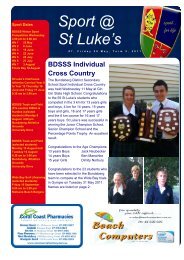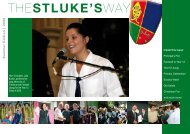How I Can Be Safe at School - pamphlet - St Luke's Anglican School
How I Can Be Safe at School - pamphlet - St Luke's Anglican School
How I Can Be Safe at School - pamphlet - St Luke's Anglican School
Create successful ePaper yourself
Turn your PDF publications into a flip-book with our unique Google optimized e-Paper software.
<strong>St</strong> Luke’s <strong>Anglican</strong> <strong>School</strong> has <strong>School</strong><br />
<strong>Safe</strong>ty Officers who are the people you<br />
should see when you have a complaint<br />
about any harm done to another person<br />
or yourself or you experience any<br />
behaviour th<strong>at</strong> makes you feel<br />
uncomfortable.<br />
<strong>School</strong> <strong>Safe</strong>ty Officers<br />
Mr Peter Robinson – 4132 7544<br />
Director of <strong>St</strong>udents<br />
Mrs Susan Wilson – 4132 7520<br />
Head of Primary <strong>School</strong><br />
Mr Nick Johnstone – 4132 7523<br />
Head of Middle <strong>School</strong><br />
Mr David Eke – 4132 7523<br />
Head of Campus<br />
<strong>How</strong> to contact the<br />
Director of Professional<br />
<strong>St</strong>andards:<br />
<strong>Anglican</strong> Church of Australia<br />
Diocese of Brisbane<br />
<strong>St</strong> Martin’s House, 373 Ann <strong>St</strong>reet,<br />
Brisbane Qld 4000<br />
GPO Box 421 Brisbane QLD 4000<br />
Telephone 07 3835 2266<br />
Facsimile 07 3831 9873<br />
Email: dops@anglicanbrisbane.org<br />
<strong>How</strong> I can be<br />
safe <strong>at</strong> school<br />
The <strong>Anglican</strong> Church is committed to<br />
the provision of a safe, supporting and<br />
ethical environment
Children and young people <strong>at</strong>tend<br />
school for many reasons – for<br />
learning, for intellectual and personal<br />
growth, to make and be with friends, to<br />
particip<strong>at</strong>e in school activities such as<br />
music, sport and drama; and, if they<br />
<strong>at</strong>tend an <strong>Anglican</strong> <strong>School</strong>, to gain<br />
religious and spiritual knowledge.<br />
The best way for children and young<br />
people to learn <strong>at</strong> school is in a safe<br />
environment and where they know<br />
people are helpful.<br />
I am committed to ensuring th<strong>at</strong> all the<br />
children and young people who <strong>at</strong>tend<br />
our schools are safe <strong>at</strong> all times.<br />
I know th<strong>at</strong> sometimes things happen<br />
<strong>at</strong> school which are of concern.<br />
Things such as bullying do happen.<br />
When they happen, you need to know<br />
wh<strong>at</strong> to do and who to go to.<br />
This brochure explains those things.<br />
It tells you who to see and wh<strong>at</strong> to do.<br />
Please read it carefully; and it will help<br />
you be safe <strong>at</strong> school.<br />
+ Phillip Aspinall<br />
Archbishop of Brisbane<br />
<strong>St</strong> Luke’s <strong>Anglican</strong> <strong>School</strong> is committed to ensuring<br />
th<strong>at</strong> all students are safe.<br />
To make sure this happens, we have policies and<br />
procedures, which will help us to provide a safe<br />
environment for all students and members of the<br />
school community.<br />
This brochure explains wh<strong>at</strong> you need to do if you<br />
do not feel safe.<br />
Wh<strong>at</strong> behaviours are unacceptable in a<br />
safe environment?<br />
Listed below are the behaviours in the school<br />
environment, which we do not accept.<br />
Inappropri<strong>at</strong>e behaviour: means behaviour by<br />
teachers or other people <strong>at</strong> the school, which makes<br />
you feel uncomfortable or unsafe <strong>at</strong> school.<br />
Examples of this behaviour might be being yelled <strong>at</strong><br />
or hit or being called names.<br />
Harm: means th<strong>at</strong> something has happened to you<br />
which hurts you physically [like being punched];<br />
emotionally [like being upset <strong>at</strong> being called names]<br />
or psychologically [like being told th<strong>at</strong> you ‘are no<br />
good’ or being abused or neglected]. It also<br />
includes sexual harm – like being touched or sent<br />
text messages or emails. It doesn’t m<strong>at</strong>ter how the<br />
harm is caused.<br />
Self-harm: means harm being done to yourself by<br />
yourself. It can include cutting or scr<strong>at</strong>ching<br />
yourself; taking dangerous risks; abuse of legal and<br />
illegal drugs; or medic<strong>at</strong>ion or alcohol. Sometimes,<br />
kids hurt themselves because of personal worries or<br />
fears; and talking about these to someone they trust<br />
needs to happen to stop the harm.<br />
Pastoral support will be offered to anyone making<br />
the complaint; and may be offered to the person who<br />
is complained about.<br />
Questions you might have:<br />
If I make a complaint, will it be kept confidential?<br />
The name of any student making a complaint will be<br />
kept confidential as far as possible. <strong>How</strong>ever, there<br />
are some persons who need to be told the student’s<br />
name: the person/s against whom the complaint has<br />
been made, any person who investig<strong>at</strong>es the<br />
complaint, any person who may take actions which<br />
flow from the complaint, and any person offering<br />
support to the student or other persons involved. In<br />
addition, it may be necessary to inform the st<strong>at</strong>utory<br />
authorities and the Diocese.<br />
Will my parents be told th<strong>at</strong> I have made a<br />
complaint <strong>at</strong> school?<br />
Yes – generally, your parents will be informed as<br />
soon as practical.<br />
Why does the school need to have these<br />
procedures?<br />
<strong>Anglican</strong> schools have a Christian oblig<strong>at</strong>ion to<br />
provide a safe and caring environment for all<br />
students. In addition, there are legisl<strong>at</strong>ive oblig<strong>at</strong>ions<br />
placed on schools by the st<strong>at</strong>e authorities.<br />
Wh<strong>at</strong> happens if I make a complaint th<strong>at</strong><br />
isn’t true?<br />
The Principal, Mr Martin O<strong>at</strong>es, will enquire into each<br />
complaint so th<strong>at</strong> he can be reasonably sure th<strong>at</strong><br />
some kind of harm has occurred. If Mr O<strong>at</strong>es<br />
believes th<strong>at</strong> the complaint is not true, some further<br />
actions may be taken including speaking with the<br />
student, informing the student’s parents, informing<br />
the person against whom the complaint has been<br />
made, and any other action th<strong>at</strong> Mr O<strong>at</strong>es considers<br />
appropri<strong>at</strong>e and necessary.<br />
<strong>How</strong> do I make a complaint?<br />
You can approach one of our design<strong>at</strong>ed <strong>School</strong><br />
<strong>Safe</strong>ty Officers and advise him / her of the complaint.<br />
Altern<strong>at</strong>ively, you can complete the appropri<strong>at</strong>e form<br />
– these are available throughout the school. <strong>School</strong><br />
<strong>Safe</strong>ty Officers are trained in handling these m<strong>at</strong>ters<br />
sensitively. Once the complaint is made, the Mr<br />
O<strong>at</strong>es may need to make some enquiries to be<br />
reasonably s<strong>at</strong>isfied th<strong>at</strong> there are grounds for a<br />
complaint.<br />
Wh<strong>at</strong> can I do if I have other questions?<br />
You may approach Mr O<strong>at</strong>es who would be pleased<br />
to answer any questions or concerns you may have.



